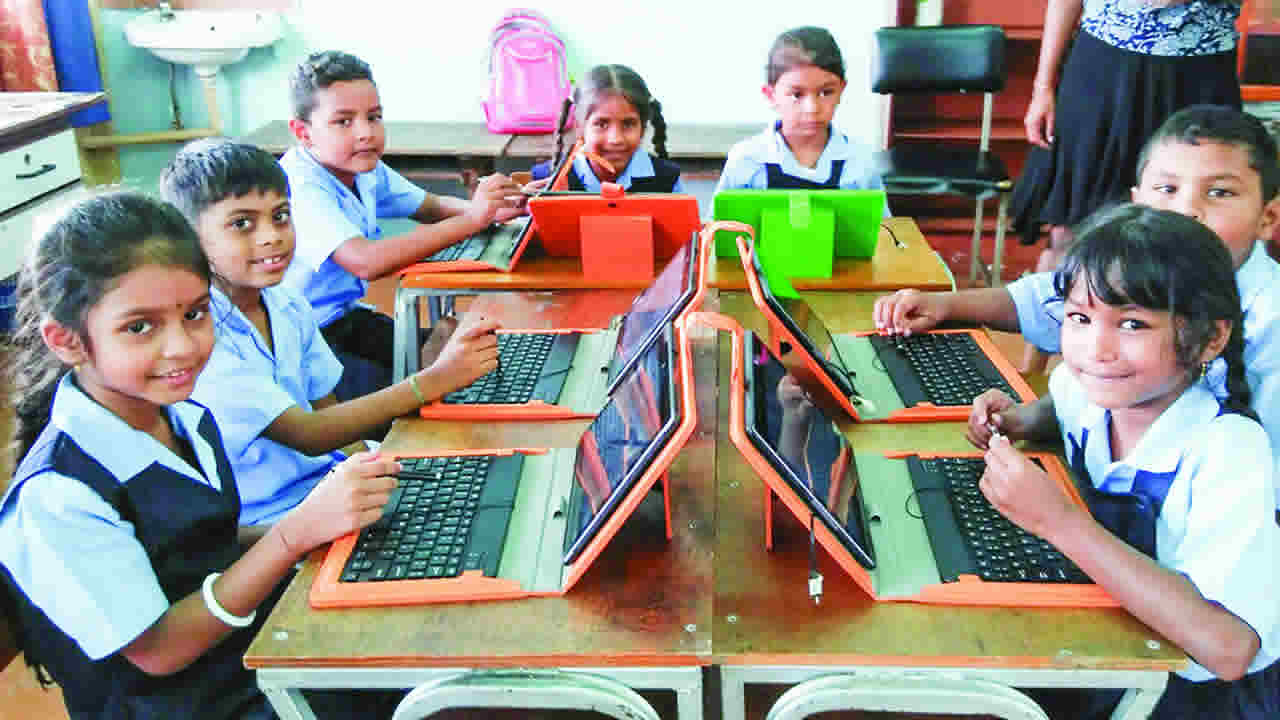
Year 2018 will mark a new era in the education system of Mauritius with the launch of smart classes for Grade 1 and Grade 2 in government primary schools. The project is cosponsored by the Indian government and will distribute 26,800 tablets to the students.
These smart classes might inspire kids to go school regularly along with ‘gamification’ and simplification of studies. This step will lay the foundation of the Government’s Vision 2030 in the Education sector, where schools will not only create users but will also create a nation of innovators and other technology creators.
On 9th January, when students of Grade 1 and Grade 2 entered their classrooms, they were welcomed with new gadgets, one big charger rack of tablets, one projector which was hanging from the ceiling and a smart board. Kids were excited with this new infrastructure.
They were more than excited when teachers informed them that soon they were going to receive their lessons in a tablet. When they saw these tablets, the excitement reached a new height. However, today, all children have already been introduced to mobiles, tablets, laptops and computers at home, but having this facility in school along with friends created a different level of happiness.
In Mauritius, teaching and learning restricted to classroom sessions prominent with white chalk, dusters and blackboards will belong to the past. Now, we are entering an era of smart classrooms for young learners, which will make learning fun through the use of digital equipment like the tablets and a projector.
Reaction of students
These six- and seven-year-old students are far more tech savvy than their parents were at the same age. They know how to start the tablet, how to make it stand using a cover, how to open applications and how to play games. Sometimes, they can even show their parents how to use it. For example, in class they discuss what they do with their parents’ mobiles and tablets, which are the games they play and so on. I was pleasantly surprised when I heard these kids discussing features and setting up of mobiles and iPads.
Reaction of Parents
Parents are already worn-out watching their kids using their mobiles all the time at home. The recent news regarding tablets in schools has added to their headaches. They think that it is just going to increase screen time in a kid’s life. According to parents, “the only time children are free from technology is when they are in schools, but now with the introduction of these tablets, they wouldn’t know any other life without technology.” Parents are also concerned about the psychological and physical effects of technology on their kids. They are especially concerned about any adverse effect on the eyesight of their children, with this increase in screen time.
Ministry of Education
The Ministry of Education has already informed Mauritians about the need to increase the use of technology in education. The introduction of ICT in early education will surely lay the foundation of major reforms in the Education sector of Mauritius. The Indian government owned company EDCIL has prepared these tablets and a part of the content. This project is the fastest completed project by any Indian company in Mauritius.
Benefits for the very young learners
There are benefits as well as disadvantages to all kinds of technology. We (all stakeholders) need to know how use it conveniently, and we have to explain this to children as well. Parents have to be fully cognizant with this technology that is being introduced by the Mauritian government for the facilitation of learning in classrooms:
- Digital tools help students understand the topic better.
- Study in playing mode.
- Class lessons will be more interesting.
- Inspire kids to go school regularly.
- Interactive environment favours better learning
- Performance and progress of students can be seen digitally.
Challenges
Mauritius has seen a failed tablet distribution project a few years back, when around 20,000 tablets were distributed to Form 4 (Grade 10) students. The issue started with students utilising them for personal use and ended with poor quality tablet malfunctioning and all tablets were withdrawn. But this time, all these issues were kept in mind when this project came on table.
In this specific instance, the project is dealing with very young learners who are expected to obey the teachers. The tablets will be kept in school under the teachers’ administration and will be used according to needs in class. Parents will also have a part to play, for example, they will have to limit screen time for their kids at home.
The school administration shares the responsibility to take care of the maintenance of this whole setup. Teachers, especially, bear a lot of accountability in understanding and making use of this technology at its best. Tablets and smart boards can also be a problem if they are not working accurately on a given day.
A teacher would always need to have a back-up lesson plan or activity, in case the technology crashes. The success of this whole project will be on the shoulders of teachers. As for students, they are eagerly waiting for the launch of these tablets so that they can start on their path to becoming smart in these smart classes.
 J'aime
J'aime














